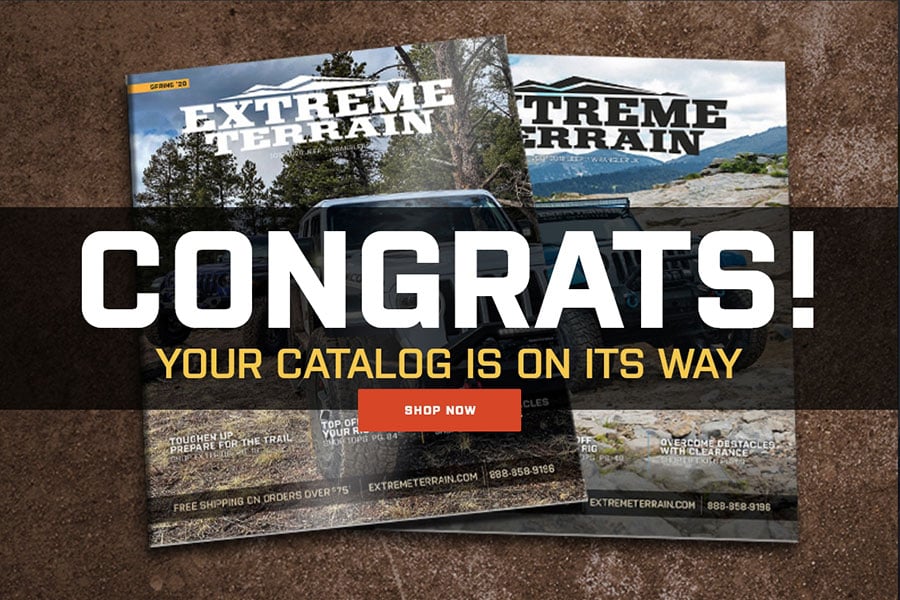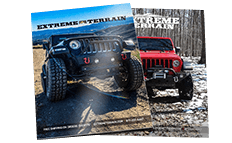

Top Sellers for Wrangler
How to Install Rugged Ridge 1.75 in. Spacer Lift w/ Shocks on your Wrangler

Shop Parts in this Guide
Congratulations on your purchase of a Rugged Ridge™ suspension kit. To fully enjoy and understand this product we ask that you take a few moments to read through these instructions. Before beginning the installation, read these instructions and the enclosed driver’s “WARNING NOTICE” thoroughly and completely. Also affix the “WARNING” decal in passenger compartment in clear view of all occupants. If any of these items are missing from this instruction packet, do not proceed with installation, but call Omix-Ada to obtain needed items. If you have any questions or reservations about installing this lift kit, call Omix-Ada at 770-614-6101 for Technical Assistance or Customer Service departments.
A FEW WORDS ABOUT SAFETY:
Your safety and the safety of other motorists is very important. As the owner of a modified suspension vehicle you are the person choosing the combination of suspension, wheels, tires and drive train that best fit your intended use. Likewise, you are the person responsible for the safety and legality of the vehicle you modify. In modifying your vehicle’s suspension, balance your off-road capabilities against how the vehicle may actually be used off-road and on-road.
It is not practical or possible to warn about all hazards associated with modifying your suspension for improved off road capabilities. To help you make informed decisions about safety, we have provided certain information in the form of “Notices”, “Cautions”, and “Warnings”. This information alerts you to potential hazards that could hurt you or others.
Notice : This is a caution against anything which may cause damage to the vehicle or its equipment if the caution is ignored. The Notice includes information about how you can avoid or reduce those risks.
Caution: This is a signal telling you that you or others CAN BE HURT if you dont follow the instructions. The Caution includes information about how you can avoid those risks
Warning: This is a signal telling you that you CAN be KILLED or SERIOUSLY HURT if you don’t follow the Warning. The Warning includes information about what you must or must not do in order to reduce the risk of injury to yourself and others.
PRE-INSTALLATION NOTES:
Notice: This kit should only be installed by a professional mechanic or individual with significant automotive experience.
• Refer to parts list and inventory your kit to insure all parts and hardware pieces are available before beginning installation. Contact your independent dealer immediately if parts are missing.
• Installed lift will vary depending on vehicle options and configuration. As a reference and important guide should technical assistance be required, establish base ride-height measurements before beginning installation. Park vehicle on hard, level surface. Carefully measure the four corners of the vehicle (front and rear –both sides) from the ground up to the center of the fender opening above the axle. Record below and save.
Driver Side Front: _____________Passenger Side Front:__________________
Driver Side Rear: _____________Passenger Side Rear:___________________
! Warning: Improper use of air and power tools can cause serious injury. Familiarize yourself with tool manufacturers warnings and instructions before use. Always wear approved safety glasses.
COMPONENT LISTING
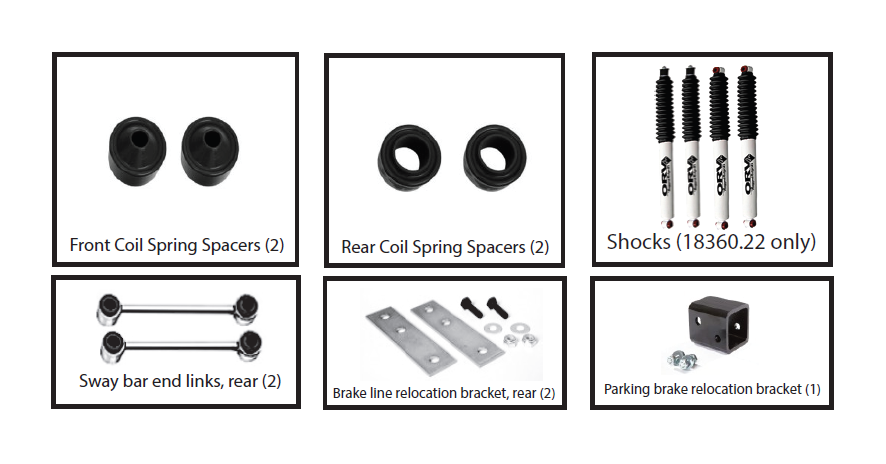
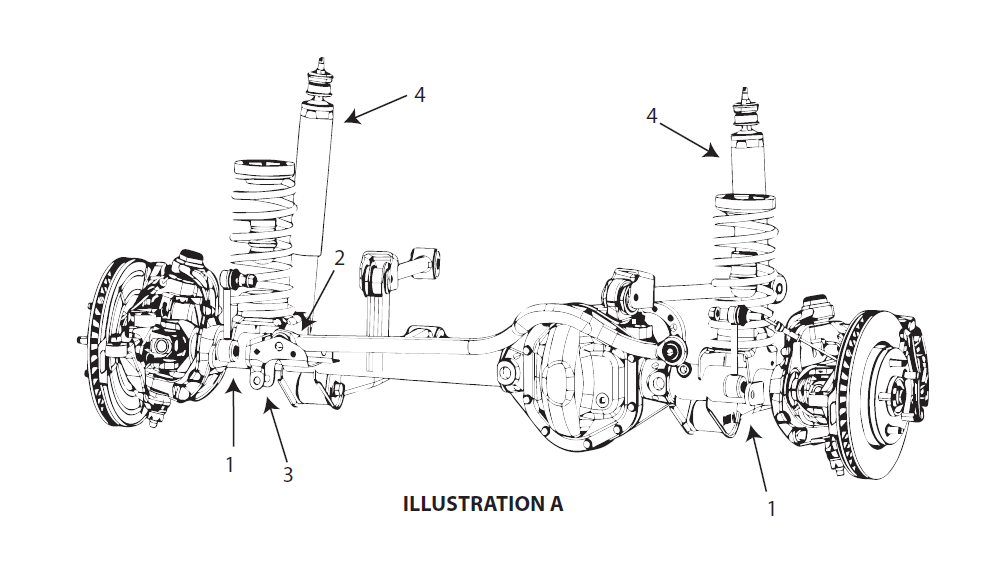
Installation: Front Suspension
WARNING: An alignment must be performed after installing this kit. Failure to do so will cause dangerous driving conditions and premature tire wear.
CAUTION: It is suggested that a thread penetrating spray is used on all bolts and nuts to aid in removal. Always use protective eye wear and gloves when working on suspension components.
1. Park vehicle on flat, level ground and set emergency brake.
2. Raise front of vehicle and support frame rails using jack stands. Using a floor jack, support center of front axle, remove both wheels.
NOTICE: It is recommended to disconnect the front drive shaft to avoid damage. Make sure to mark both sides of the connection so you can properly align when you reconnect it. Tie loose end of the drive shaft up so it will not hang down. Failure to do so may result in damage to your drive shaft.
3. Disconnect the front sway bar end links using a 18mm socket. (see 1A) Disconnect the front track bar from the axle using a 21mm socket. (see 2A)
4. If installing Rugged Ridge Steering Stabilizer, remove factory steering stabilizer using 18mm socket. (see 3A)
5. Disconnect front shocks using an 18mm socket. (see 4A) Unbolt the front rubber brake hose retainers from the frame.
6. Remove the ABS line from the retainer bracket on each axle spindle.
7. Unbolt the front brake lines from the frame.
NOTE: On newer model vehicles the brake line bracket by the lower control arm will need to be loosened also.
UPDATE NOTICE: For JK wranglers with center fixed mount bracket brake lines. A relocation bracket is supplied to relocate the brake line.
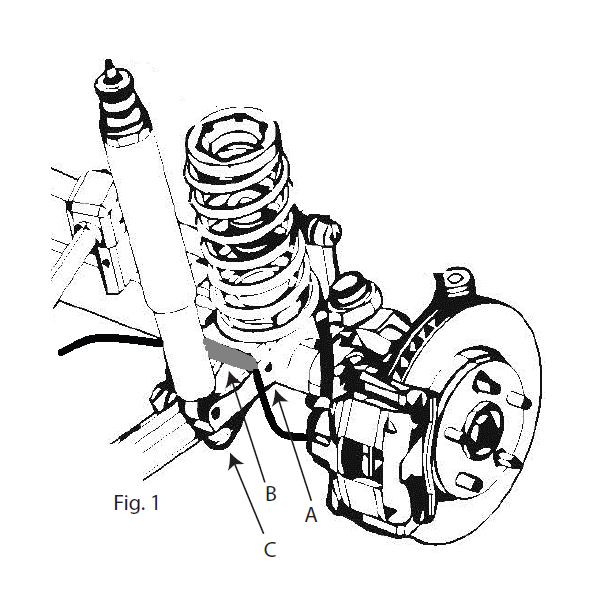
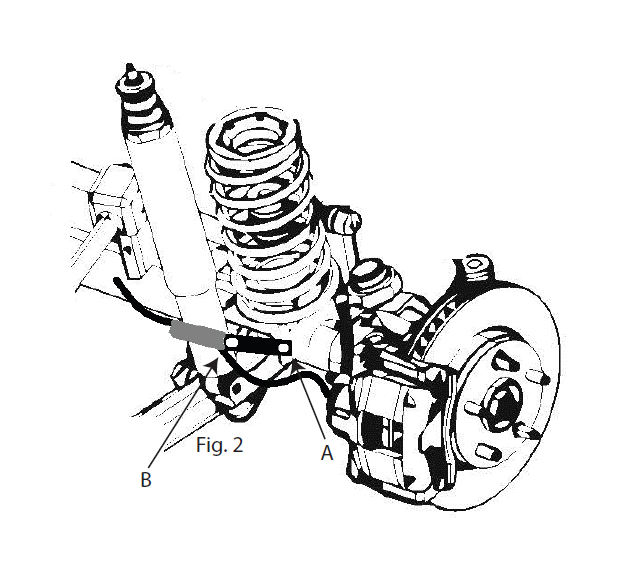
Step 1A. Remove the factory bolt holding the brake line bracket to the spring mount . (See fig. 1A)
Step 2A. Remove the brake line brake bracket from the coil spring mount. (See fig. 1B)
Step 3A. Remove the lower shock mount bolt. (See fig. 1C)
Step 4A. Compress the lower shock and move the brake line to the outside of the shock.
Step 5A. Reattach shock and tighten.
Step 5A. Using the supplied brake line relocation bracket, mount to the existing hole in the coil spring mount. Mount bracket on the outside of the coil spring mount at a 45 deg. angle upward. (See fig. 2A)
Step 6A. Attach the factory brake line to the relocation bracket using the factory bolt. (See fig. 2B)
Step 7A. Bend bracket slightly outward away from shock.
8. Lower the front axle. Remove both front coil springs.
NOTICE: Inspect coil springs, coil spring isolators, and mounting areas for any cracks, broken or worn parts. Replace or repair any affected areas before you continue.
NOTE: Use of a thread locking liquid is recommended during reassemble of vehicle.
9. Install the new coil spring spacers over the factory bump stop with teh lip of the spacter point down. Reinstall the coil spring and the coil spring isolator.
10. Let the weight of the frame down on to the new coils. Re-Attach front drive shaft, end links, track bar, etc.
NOTE: The rear sway bar links will be used in the front suspension.
11. Install shocks, steering stabilizer. Install tires/wheels.
12. Torque all nuts and bolts to factory specifications. Re-check after 100 miles.
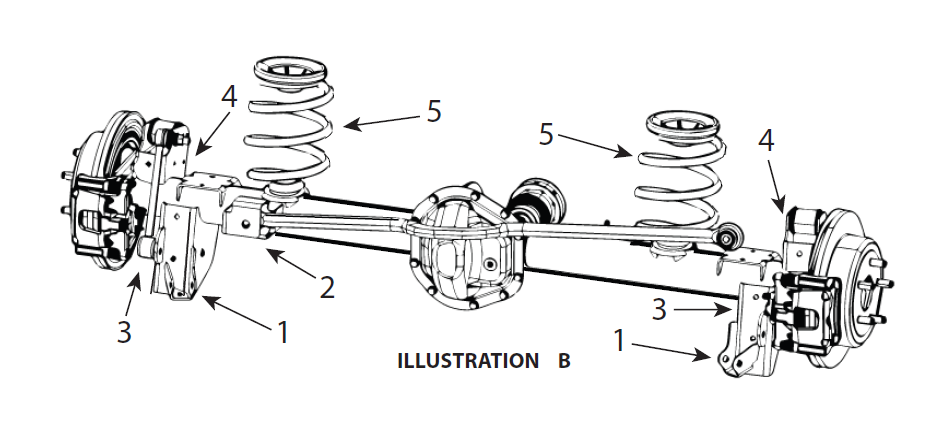
Installation: Rear Suspension
1. Raise the rear of the vehicle and properly support frame rails using jack stands. Using a floor jack, support the rear axle to relieve tension on the shocks and remove wheels. Disconnect both rear shocks using 16mm socket. (See #1B)
2. Disconnect rear track bar from the axle using 21mm socket. (See #2B). Remove both rear sway bar end links using 18mm socket. (See #3B).
3. Disconnect ABS sensor wire fasteners from frame and upper control arm bracket on both sides (See #4B) and disconnect the brake line bracket from frame. Unbolt the emergency brake line retainer from the bottom of the tub above the axle. Lower the axle down and remove factory rear coils. (See #5B)
4. Install new rear coil spring spacers on top of the factory springs. Be sure to re-use the upper OE Rubber isolator pad on top of the spacer. Torque all fasteners.
5. Install the rear brake line extension brackets.
6. Install the emergency brake cable relocation bracket.
7. Install the new extended rear sway bar links.
8. Let weight down on coil springs and install the new extended rear sway bar links.
9. Re-attach the ABS lines, shocks, sway bar, etc..
10. Install tires/wheels and lower vehicle to the ground.
Post Installation Checks/Alignment:
• After installation is complete, double check that all nuts and bolts are tight. (Do not re-tighten nuts and bolts where Loctite was used). Check to ensure there is adequate clearance between all rotating, mobile and fixed members.
• A transfer case lowering kit is available if a drive shaft vibration is present.
• Rotate drive-shafts and check for interference at differential yoke and cardan joint. If necessary, lightly dress casting(s) and/or U-joint tabs in order to eliminate binding.
• Check clearance between inner side wall of tires and links. It may be necessary to adjust steering stops.
NOTICE: Adjust drag link so that steering wheel remains centered and wheel sweep from side to side remains equal. Failure to do so may cause computer errors, odd handling characteristics and poor performance. Have a qualified alignment center check and realign to factory specifications.
NOTICE: With vehicle securely elevated, carefully inspect and adjust to assure adequate clearance between tires (inner side wall), body and suspension components throughout range of steering and suspension travel. Additionally, carefully inspect and adjust to maintain clearance between suspension components, wiring harnesses, exhaust, brake and fuel lines, fuel tank, oorboards and body panels. Complete by properly torquing all fasteners.
NOTICE: With vehicle now on oor, again check clearances, cycle steering lock to lock and test proper brake operation.
NOTICE: Re-torque fasteners after 500 miles. Thereafter, regularly inspect and re-torque as needed. Follow vehicle manufacturer’s recommended maintenance procedures and routinely inspect your vehicle components for unusual wear or off-road damage.Raised vehicle height requires realigning headlights. Consult your state’s lighting regulations. Wheels must be realigned by qualified service center to factory specifications.
WARNING: Avoid compromising vehicle handling and safety (including roll over risk) by NOT adding, combining or fabricating additional lift devices (ex. body lifts) with this product. Also be aware that most states have restrictions on height modifications for vehicles used on-road. Consult your vehicle owners manual, the instructions and warnings accompanying this product and state law before undertaking these modifications or using your modified suspension vehicle on-road.














